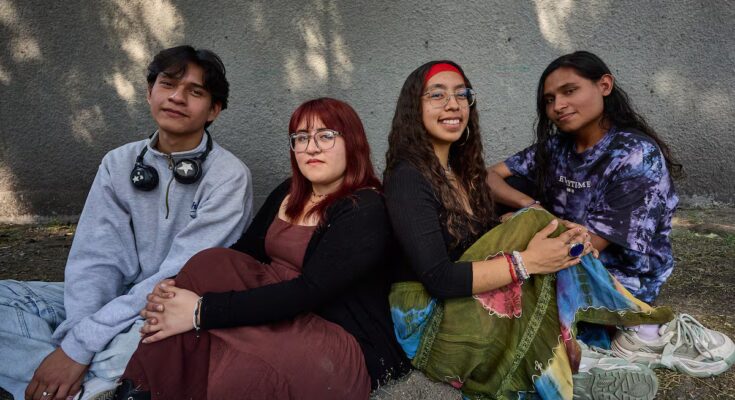The flag of the Straw Hat Pirates from Japanese animation One piece waving at Generation Z rallies symbolizes, in the words of the series’ fans themselves, “freedom and justice.” The word “freedom” is repeated like a desire among the participants in last Saturday’s march and among the 10 young people consulted by EL PAÍS. But what is that freedom they seek so much? While it doesn’t always mean the same thing, for them it translates into conditions such as employment, education, mental health, transportation, housing and security, which allow them to feel less vulnerable.
In less than a week, Mexico City has seen two marches – one much more successful than the other – organized online as protests by young people aged 15 to 28. The reality, however, is different, as the majority of participants were over 30 years old. The absence of those who should have been the protagonists of these mobilizations was not due to a lack of young people: although the latest census is from 2020, United Nations projections estimate that 38 million people belong to generation Z, a quarter of the Mexican population.
EL PAÍS consulted 10 young people between 16 and 26 years old – students, workers, residents from different parts of the capital and the State of Mexico – to find out their concerns and how they position themselves in relation to the country in which they live. Although their personal experiences are different – some travel up to three hours on public transport, others face precarious jobs, some experience the anxiety of choosing a career and others the frustration of not finding work – they share similar diagnoses such as an uncertain working future, the lack of access to their home, the feeling of living in a country without security and a deep distrust of the political class.
There are also nuances. While those who participated in the second march placed themselves ideologically in the center, those who rejected it said they were left-wing but non-partisan. Some, like Bruno Trejo (Mexico City, 17 years old) try to stay informed, while others, like Javier, 17 years old from the capital, admit that their view of the world depends entirely on the TikTok algorithm. Nonetheless, everyone agrees that adulthood comes to them in more adverse conditions than those experienced by previous generations.
Most young people, seven out of 10, surpass the education their parents had, however every two years the percentage decreases, according to the Espinoza Yglesias Study Center. Carla Arroyo (21), Dalay Ledezma (24), Aarón Morales (20), Alec Peñaloza (20) and Emilio Villalba (20), all university students, attribute this reduction to the fact that a degree guarantees them nothing. “I don’t see a good future. We are a generation without opportunities,” says Ledezma. “I know my career pays very poorly. I don’t know what I’ll do when it’s over,” Morales shares.

They view their jobs and economic future with despair. For economically active young people in Mexico, especially those between 20 and 29, unemployment is higher than in any other age group. Ledezma sums it up like this: “I will never be able to buy a car or a house. We think about becoming independent and we don’t see a future without roommates. Income is not payable.” It is not enough just to have a job, but also the conditions that accompany it. «Before studying I worked and I had depression, and working made me worse because, no matter how bad I felt, I had to produce. And it will be like this for your whole life. And without a pension,” he says.
Members of this generation have the lowest wages of the economically active population, ranging from just under 3,000 pesos ($163) to 9,000 ($490). Although the age at which people can legally work in Mexico is 15 years or older, informal jobs lead to the participation of children and adolescents in the workforce. Across all age groups, women earn lower incomes.

Between the ages of 20 and 29, economically active young people are those who suffer the most from unemployment among all workers, much higher than the 35-39 year old group. Angélica Ochoa, 26 years old, experiences it firsthand. He has a degree in International Relations and has been looking for work for months: “I’m saving up to study for specialization otherwise I’ll never be able to work. It’s very frustrating. Not having a job is depressing.”
The majority of those interviewed doubt whether they can live alone or aspire to wealth. Arroyo sees from Coyoacán that gentrification will affect his future. “Rent goes up and up. gringos They arrive and everything is fine,” he laments. Trejo, although younger, is no longer optimistic about the same problems: “I am directly worried about the future of work, of housing… If one day I will be able to buy something.” Peñaloza assures that this is not a fatalistic view. “My worries about whether I will have a job, whether they will pay me well or whether I will be able to be independent are valid from now on. “You don’t have to graduate to worry about the country’s situation.”

Z is a generation disenchanted with politics. Every year they move further to the left, with a clearer trend among women, who say they are slightly ahead of their peers. However, none of those interviewed declared themselves to be supporters of the party. Not even those who marched. Arroyo shares the distance with the parties, even if he considers himself to be left-wing. “It would be serious to close ourselves to ‘I am from Morena’. Nobody cares about our well-being. Among us there is bad faith towards all the rulers”, he says.

Even though the majority of young people voted for Claudia Sheinbaum, she does not show a clear interest in national politics. Of the five adults who voted last year, all canceled their votes.

The minors say they will exercise their right when it is their turn, but confess that politics seems distant and predictable to them: “All politicians lie and steal”, sums up Javier, who works in a factory at 17. Generation Z voted slightly less than the population average, with the exception of voters between 18 and 19, who tend to come closer to the polls.

The young people interviewed spend four to nine hours a day in front of the screen. Seven different social networks, although TikTok is the favorite, followed by Instagram. The algorithm dictates what they know about Mexico and the rest of the world. All but one confess to feeling uninformed. “I can’t distinguish between fake news and real news. I just listen,” admits Javier. Morales recognizes that information affects him: “Seeing chaotic news makes me anxious, so I prefer to ignore it.” Trejo reflects on his time on screen: “I spend a lot of time there and it’s really trashy content.” Peñaloza is surprised when he checks the hours he spends on the phone each day. “Because of the hours I spend on screen, I should know better.”
Younger people tend to have greater access and proximity to the Internet. In the country they spend, on average, just under six hours a day browsing from different devices.

They remain more present on networks like Tiktok or Instagram, although they tend to have interactions in most of the options on the market. The data platforms usually reserve the information of minors, to protect their information. However, the behavior of young people between the ages of 18 and 28, who make up the majority of the generational block, is known. Some networks like Twitch and Discord are not included in these studies, but sites like Resoursera point out that global Discord users spend around 3-4 hours using it weekly, and 41% of their users are between 18 and 24 years old.

Of the 10 respondents, nine said they suffered from anxiety or depression. For some, this is the primary concern. “Mental health is what worries me the most. The Internet takes us away from reality and leads us to dilemmas that are a double-edged sword. I would like social security to change and for everyone to be guaranteed mental health,” reports Ledezma. For his part, Morales shares a request: “We do not want to be victims, but we are subject to being vulnerable. We only want empathy and understanding of our social context.”
Morales details the biggest concern of his generation. “I was born during Felipe Calderón’s six-year mandate, surrounded by violence. We grew up with the fear of going out, of demonstrating, of raising our voices. It was never calm for us. What worries me most is drug trafficking.” Insecurity appears in all the testimonies, although it is accentuated among those who participated in the Generation Z demonstration on Thursday, which invoked, among its widespread demands, the insecurity that afflicts the country. Diego, 18, believes that safety is the most important thing. “We have the right to live without fear of being killed.” José, 16, who marched with Diego, adds: “We are in a narco-state. I march because I am tired of living in fear.”
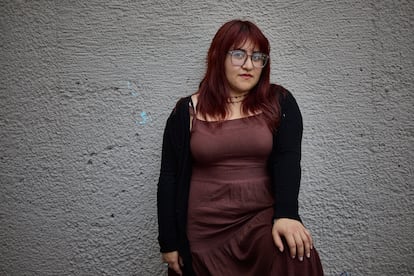
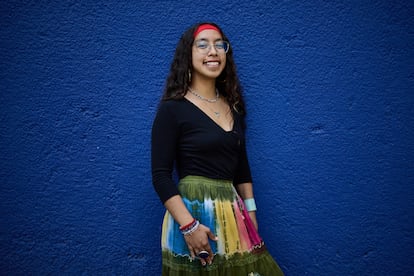
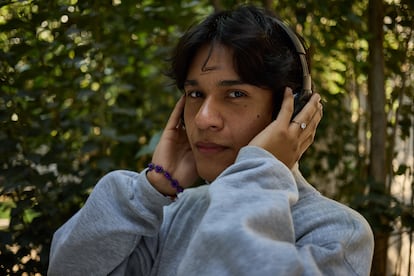
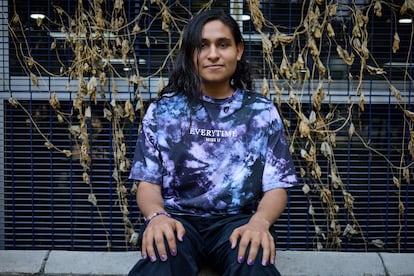
For his part, Villalba, a resident of Chalco, expresses a concern that, for him, is the most important. “It takes me a long time to get to university. I spend at least two hours, sometimes three, and spend 60 pesos a day. I’m afraid of losing a lot of my life just traveling.”
Together, the testimonies portray a generation growing up with school days, complicated commutes, low wages and a digital life that affects their way of getting information and relating to the world. With nuances and contradictions, the 10 young people consulted express the same diagnosis: becoming adults in Mexico means living in a country where the promise of stability seems increasingly distant.
